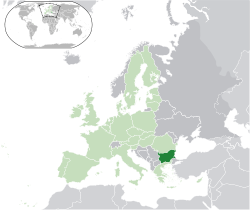Perpetrator Of Bulgaria Terror Attack Still Unidentified
By SETimes
By Svetla Dimitrova
The results of the investigation into the suicide bombing at Bulgaria’s Burgas Airport last summer are expected to become public soon, Bulgarian Interior Minister Tsvetan Tsvetanov said this week.
The July 18th attack targeted a bus carrying Israeli tourists. Five of them and the bus driver, a Bulgarian national, were killed in the explosion. At least 30 people, mostly Israelis, were wounded.

No one has claimed responsibility for the attack.
Sofia said it will not point a finger at any organisation or country until the investigation, which involves Interpol, the US and other Euro-Atlantic partner services, is completed.
Bulgarian authorities say that the perpetrators included “three to four individuals.”
“None of them is a Bulgarian national,” Tsvetanov said in an interview with Sofia-based private broadcaster Darik Radio on Saturday (December 15th).
The suspects arrived in Bulgaria “about 20 days ahead of the attack,” Sofia-based FOCUS news agency quoted the minister as saying. They entered the country from other EU member states, travelling with legitimate passports. They used fake documents, however, when registering in hotels, renting apartments and cars inside Bulgaria.
The only ID found on the suicide bomber was a fake driver’s license. Although investigators have his fingerprints and his DNA profile, they have not been able to identify him.
“Once the attacker has been identified, we will be able to explain the whole scheme,” Bulgarian Prime Minister Boyko Borisov said.
When asked to specify the masterminds of the attack, Tsvetanov told Darik Radio that “Certain assumptions can be drawn up on the basis of all the information gathered so far,” but he didn’t elaborate.
Bulgarian security and counterterrorism expert Slavcho Velkov says the answer will become known once the motives for the attack are clear. What also needs to be established, he said, is “whether it was an act of revenge against Bulgaria, rather than Israel, but was carried out so as to look as if it was targeted at Israel.”
“We will ultimately know who was behind the attack once the question ‘why?’ has been answered,” he told SETimes.
There could be various reasons why international efforts to identify the alleged attacker have proven fruitless so far, Velkov said, noting that it was “highly probable” that the suspect was not a true suicide bomber. He “was most likely a mercenary, who was hired to deliver the explosive.”
Furthermore, efforts to establish the suspect’s identity are not global. The search is taking place in countries where Interpol has representation, and where Bulgarian special services, CIA and FBI are able to do checks, according to Velkov.
Velkov said that according to Arab experts, the suspect was “80 percent Arab, quite probably born in Syria, Lebanon, Algeria, or Morocco. Once his identity has been established, [the services] will begin looking for the organisation that trained or hired him,” he said.
